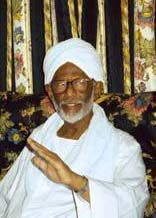 |
| Vol. 1 No. 12 | December 1999 |
Sudanese President Omar Hassan al-Bashir imposed a state of emergency and dissolved parliament on December 12 in a move that may signal the political eclipse of the country's Islamic fundamentalist parliament speaker, Hassan Turabi.
Bashir's power play was apparently timed to preempt a parliamentary vote called by Turabi which would have strictly limited the power of the presidency (the formal excuse was that Turabi had "leaked state secrets" to the public). The decision was clearly coordinated with Egypt and Libya, which have long sought to undermine Islamist political power in the country.
 |
| Hassan Turabi |
Turabi's National Islamic Front (NIF) was instrumental in supporting the military coup that ousted the elected government of Sadiq al-Mahdi in June 1989 and installed Bashir as president. However, the Islamist/military alliance began to unravel in recent months after Turabi began supporting democratization in the country. Turabi dissolved the NIF and established a new party, the National Congress, which eschewed overt links to the ruling regime (none of the members of the party secretariat have government posts) and sought to forge new alliances with social forces that would allow it to assume autonomous political power in forthcoming elections. He had also begun publicly criticizing Bashir, casting himself as a reformist opposition leader that expressed the voice of the people.
As a result, military elites in the executive branch of the Sudanese government began to perceive Turabi as a direct threat to their political power. Prior to Bashir's dissolution of parliament, a "Memorandum of Ten" signed by senior ministers called for the state to exert authority over Turabi's National Congress.
Turabi's political future is unclear. Only a few members of the ruling regime have rallied to Turabi's side, most notably Foreign Minister Mustafa Osman Ismail, who resigned on December 21. However, he has reportedly established contacts with several key opposition leaders, including former prime minister Sadiq al-Mahdi. Although Turabi maintains control over loosely-organized paramilitary forces, it is doubtful that either side will undertake armed hostilities--Turabi knows his supporters would be overwhelmed in such a confrontation, while Bashir would risk losing even more popular support were he to initiate a crackdown.
� 1999 Middle East Intelligence Bulletin. All rights reserved.